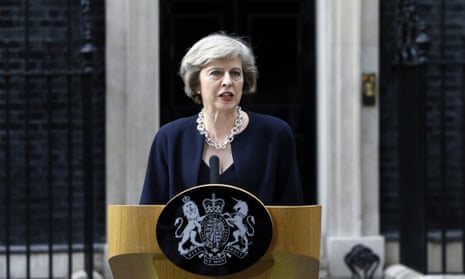White British people are significantly more likely to own their own homes and have jobs than those from ethnic minorities, but are less likely to go to university if they attend state school, a new “race disparity audit” ordered by Theresa May will show.
The data, due to be published next week, will give unprecedented insight into how people from different backgrounds are treated in society, including their access to healthcare, education, employment and in the criminal justice system.
Early data released by No 10 suggests the audit will show huge disparities across people of different races and backgrounds when it is revealed on a new website called Ethnicity Facts and Figures.
One of the starkest differences emerges in the unemployment rate, which is 5% for white British groups and 8% for black, Asian and minority ethnic people of working age. Employment rates are 76% for white people and 64% for ethnic minority groups.
The audit found inequality in home ownership, showing two in three white British householders own their home compared with two in five householders from any other ethnic group.
Different trends were shown in education, where the audit found white pupils from state schools had the lowest university entry rate in 2016. The highest attainers were pupils of Chinese origin, among whom almost a quarter attained three A grades or higher at A-level and almost three out of five went to university.
The audit was requested by May after she made a speech outside Downing Street upon becoming prime minister in which she pledged to tackle injustices in society.
Speaking before the publication of the full report, May said the work was about “holding a mirror up to our society”.
“The idea itself is not new – Charles Booth’s maps of rich and poor areas in Victorian London drew attention to hardship that was too often hidden – but this focus on how ethnicity affects people’s lives will present findings that are uncomfortable,” she said.
“My most fundamental political belief is that how far you go in life should be based on your talent and how hard you work - and nothing else. Britain has come a long way in my lifetime in spreading equality and opportunity, but this audit will be definitive evidence of how far we must still go in order to truly build a country that works for everyone.”
May is likely to refer to the forthcoming audit in her speech to Conservative party conference on Wednesday, as she seeks to give her premiership a central mission after the election result caused a disaster for the Conservative party.
As she attempts to turn attention to her domestic agenda as well as Brexit, the prime minister will refer back to her speech from Downing Street in July 2016, when she said: “If you’re black, you’re treated more harshly by the criminal justice system than if you’re white” and “if you’re a white, working-class boy, you’re less likely than anybody else in Britain to go to university.”
In response to the audit’s findings on employment disparities, May will ask for new measures in hotspots, including mentoring programmes to help people from ethnic minorities into work and targeted schemes for younger people aged 16 to 24 offering English, maths and vocational learning alongside work placements.
The audit will be published just two weeks after the Guardian’s Colour of Power project showing that barely 3% of Britain’s most powerful and influential people are from black and minority ethnic groups, according to a broad new analysis that highlights startling inequality despite decades of legislation to address discrimination.
From a list of just over 1,000 of the UK’s top political, financial, judicial, cultural and security figures drawn up by the Guardian in partnership with Operation Black Vote and in consultation with academics, only 36 (3.4%) were from ethnic minorities (BAME). Just seven (0.7%) were BAME women.
The numbers showed a disconnect with the composition of the UK population, almost 13% of which has a minority background. In some sectors – the police, military, supreme court and security services as well as top consultancies and law firms – there were no non-white leaders at all.
